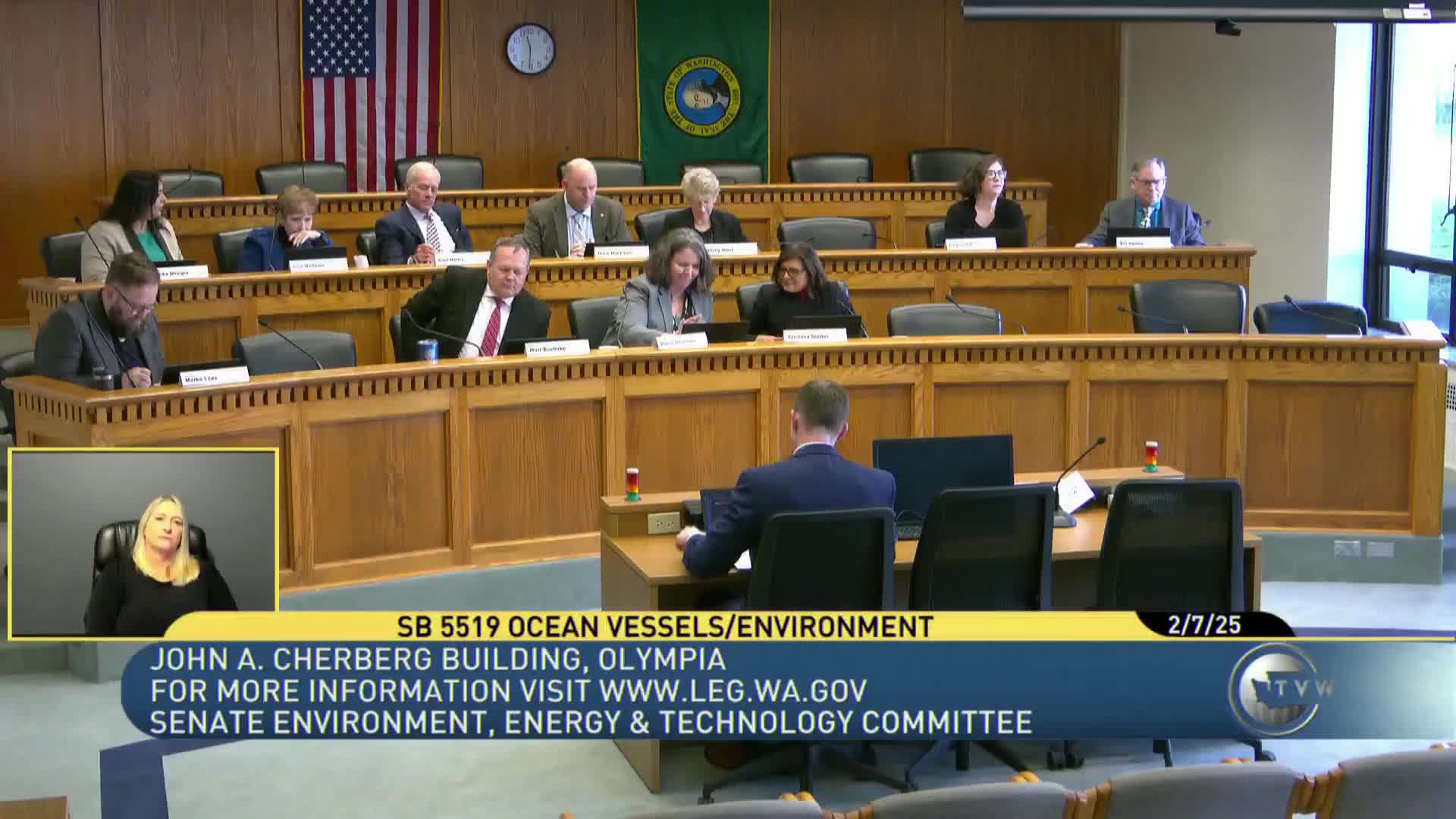Committee hears opposing views on bill to limit high‑sulfur ship fuel and scrubber discharges in Washington waters
Get AI-powered insights, summaries, and transcripts
Subscribe
Summary
Senate Bill 5519 would prohibit ships from using fuel above 0.1% sulfur by weight within 3 nautical miles of Washington shorelines beginning in 2028; industry groups warned of legal and operational impacts while environmental, tribal and public‑health witnesses urged the change to protect water and air quality.
The Senate Environment, Energy & Technology Committee on Jan. 31 heard hours of testimony on Senate Bill 5519, a measure that would bar vessels from using marine fuels exceeding 0.1% sulfur by weight while operating within 3 nautical miles of Washington shorelines beginning Jan. 1, 2028, and would establish recordkeeping and limited noncompliance fee provisions.
Sponsor Sen. Liz Lovelett (D‑40) framed the bill as a public‑health and environmental protection measure for the Salish Sea and Puget Sound. "These fuels are far more readily available than they were even 10 years ago," Lovelett said, and argued the bill would reduce particulates and other pollutants that affect marine life, crew and coastal communities.
Industry associations, ports and some carriers opposed the bill or urged major revisions. Jacqueline Moore of the Pacific Merchant Shipping Association warned of "clear legal as well as jurisdictional challenges," citing federal preemption and Ninth Circuit precedent. The Northwest Seaport Alliance and Port of Seattle representatives raised concerns that closed‑loop scrubbers (which collect wash water for shore disposal) provide water‑quality benefits when managed at berth, and that the bill’s fee language could inadvertently penalize vessels already compliant with low‑sulfur fuel standards.
Ports and carrier groups also warned that a strict state standard could complicate deployment of new low‑ or zero‑carbon fuels, such as green methanol, if national or international guidelines are not aligned. The Port Of Seattle noted voluntary and regulatory measures already in place — including shore‑power agreements and international emission control areas (ECAs).
Public‑health and environmental witnesses urged the committee to limit scrubber discharges or require cleaner fuels. Dr. Emery Dooley, testifying for Washington Physicians for Social Responsibility, said particulate matter from ship emissions is linked to heart and lung disease and warned scrubbers convert air pollution into acidic, toxic wastewater. Friends of the Earth, Global Underwater Explorers and local dive and conservation groups said scrubber wash water is toxic to marine organisms even at low concentrations and asked the state to follow California’s precedent.
Tribal and fishing industry witnesses described risks to salmon, shellfish and treaty‑protected resources. Lummi fisherman Jay Julius urged passage to protect salmon and orca and to uphold treaty responsibilities.
Ecology staff called for technical amendments to ensure exemptions for public‑safety vessels and research vessels and suggested aligning fee deposit language with existing state accounts. Ecology noted the bill would provide important public‑health and environmental benefits by preventing scrubber discharge into state waters.
Stakeholder debate focused on: (1) whether the state can regulate fuel use and scrubber discharges without conflicting with federal maritime law and international treaties; (2) whether closed‑loop scrubbers that offload wastewater at berth should be treated differently than open‑loop systems that discharge at sea; and (3) the bill’s potential impact on future low‑carbon fuels and port operations.
No committee vote occurred at the hearing. Multiple parties offered to provide technical analyses, including federal preemption and international law assessments, and Ecology offered implementation edits to the bill language.
